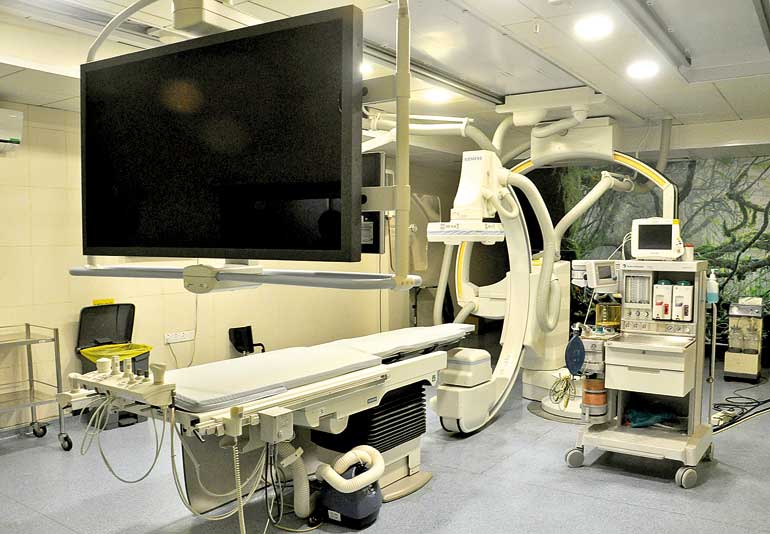Wednesday Feb 25, 2026
Wednesday Feb 25, 2026
Monday, 30 January 2017 00:02 - - {{hitsCtrl.values.hits}}

From left: Stroke Unit Resident Physician Dr. Thurul Attygalle, Consultant Interventional Radiologist Dr. Nihal Wijewardhana, Group Chief Executive Officer Dr. Manjula Karunaratne, Consultant Interventional Radiologist Dr. Lakmali Paranahewa and Medical Director Dr. Ruwan Senatilleke – Pix by Ruwan Walpola
By Fathima Riznaz Hafi
The multifunctional ‘Interventional Radiology Unit’ available only in Asiri Central Hospital, presents noteworthy development in the diagnosis and treatment of aneurysms, strokes and other neurovascular conditions through its state-of-the-art ‘Biplaner Catheterisation Laboratory’ which provides radiologists with access to large screen visualisations of the brain’s arterial network with 100% accuracy thus enabling faster and better understanding for safe interventions.
Adhering to international healthcare standards and managed by Consultant Interventional Radiologists Dr. Nihal Wijewardena and Dr. Lakmalie Paranahewa, with the support of a team of competent in-house specialists which include Stroke Physician Dr. Thurul Attygala, Consultant Neurosurgeon Dr. Sunil Perera, radiographers, anaesthetists and nurses, the Interventional Radiology Unit running on a 24/7 basis brings about remarkable new options to patients.
Speaking at a press conference held on 25 January, Dr. Paranahewa explained that since neuro intervention is a minimally invasive approach to repair brain vascular diseases, there are less side effects and the patient recovers faster. “Interventional radiology simplifies treatment in a way that minimises physical and psychological trauma. General anaesthesia can be avoided due to less pain, the incidence of complications and mortality is lower, recovery is faster thereby also shortening the length of hospitalisation and the patient is able to return to his routine activities early,” she said.
“This is one of the most technologically advanced specialties with procedures that can replace surgery. These include coiling of cerebral aneurysms and embolisation of bleeding ulcers. Other procedures which include preoperative embolisation of vascular tumours can complement surgery,” she added.
An aneurysm can be caused by cholesterol, hypertension, heart disease and congenital conditions and Dr. Wijewardena warned that it is a very serious condition which once diagnosed must be treated urgently. “In the treatment of aneurysms, most patients now prefer the endovascular procedure of coiling over the open surgical treatment of clipping. Through this coiling procedure, platinum coils are placed in the aneurysm preventing the blood from entering,” he added.

Presentation by Consultant Interventional Radiologist Dr. Lakmali Paranahewa
Patients diagnosed with AVM (arteriovenous malformation), a group of abnormal blood vessels connecting arteries and veins which when ruptured cause bleeding in the brain, and patients with certain vascular diseases in the spin, can also be treated with the endovascular procedure.
In addition, the Stroke Management Unit provides the ideal set-up where all facilities and services are available throughout the day for optimum treatment of a stroke patient. Asiri Central is the only hospital to perform clot retrieval where for an acute stroke it involves the mechanical removal of a blood clot from a patient’s brain.
However, in order to ensure sufficient stroke management, the patient needs to be brought in for treatment immediately after symptoms are identified; advised Stroke Unit Resident Physician Dr. Thurul Attygale highlighting the FAST method (face drooping, arm weakness, speech difficulty and time) in detecting a stroke.

Interventional Radiology Unit
The unit also performs a variety of peripheral vascular hepatobilliary and genitourinary interventions, especially in primary liver tumours that cannot be removed surgically; through intervention the chemotherapeutic agent is injected right into the tumour. In the diagnosis and management of gastrointestinal bleeding, interventional treatment in the form of embolisation is performed.
Also present at the press conference were four patients representing the unit’s success stories, ranging from an 11-year-old child to an elderly person.